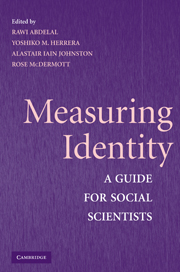Book contents
- Frontmatter
- Contents
- Contributors
- Introduction
- I DEFINITION, CONCEPTUALIZATION, AND MEASUREMENT ALTERNATIVES
- 1 Identity as a Variable
- 2 Conceptualizing and Measuring Ethnic Identity
- 3 Trade-offs in Measuring Identities: A Comparison of Five Approaches
- II SURVEY METHODS
- III CONTENT ANALYSIS AND COGNITIVE MAPPING
- IV DISCOURSE ANALYSIS AND ETHNOGRAPHY
- V EXPERIMENTS
- Bibliography
- Index
1 - Identity as a Variable
Published online by Cambridge University Press: 05 June 2012
- Frontmatter
- Contents
- Contributors
- Introduction
- I DEFINITION, CONCEPTUALIZATION, AND MEASUREMENT ALTERNATIVES
- 1 Identity as a Variable
- 2 Conceptualizing and Measuring Ethnic Identity
- 3 Trade-offs in Measuring Identities: A Comparison of Five Approaches
- II SURVEY METHODS
- III CONTENT ANALYSIS AND COGNITIVE MAPPING
- IV DISCOURSE ANALYSIS AND ETHNOGRAPHY
- V EXPERIMENTS
- Bibliography
- Index
Summary
For the past two decades, the attention given to the concept of “identity” – both in the social sciences and in the world at large – has continued to rise. Multiple disciplines and subfields are producing an expanding literature on the definition, meaning, and development of ethnic, national, linguistic, religious, gender, class, and other identities and their roles in political, social, and economic outcomes. The ubiquity of identity-based scholarship suggests an emerging realization that identities, as Rogers Smith (2002: 302) has observed, are “among the most normatively significant and behaviorally consequential aspects of politics,” yet the literature has remained diffuse. That is, despite this flurry of activity, the social sciences have not yet witnessed a commensurate rise in definitional consensus on the concept of identity.
The intense interest in scholarship on identity, as well as the many kinds of studies this fascination has spawned, has unfortunately helped undermine the conceptual clarity of identity as a variable. The wide variety of conceptualizations and definitions of identity has led some to conclude that identity is so elusive, slippery, and amorphous that it will never prove to be a useful variable for the social sciences. Rogers Brubaker and Frederick Cooper (2000) have even argued, in the most important critique of identity scholarship to date, that it is time to let go of the concept of identity altogether and to move beyond a scholarly language that they suggest is hopelessly vague and has obscured more than it has revealed.
- Type
- Chapter
- Information
- Measuring IdentityA Guide for Social Scientists, pp. 17 - 32Publisher: Cambridge University PressPrint publication year: 2009
- 32
- Cited by

